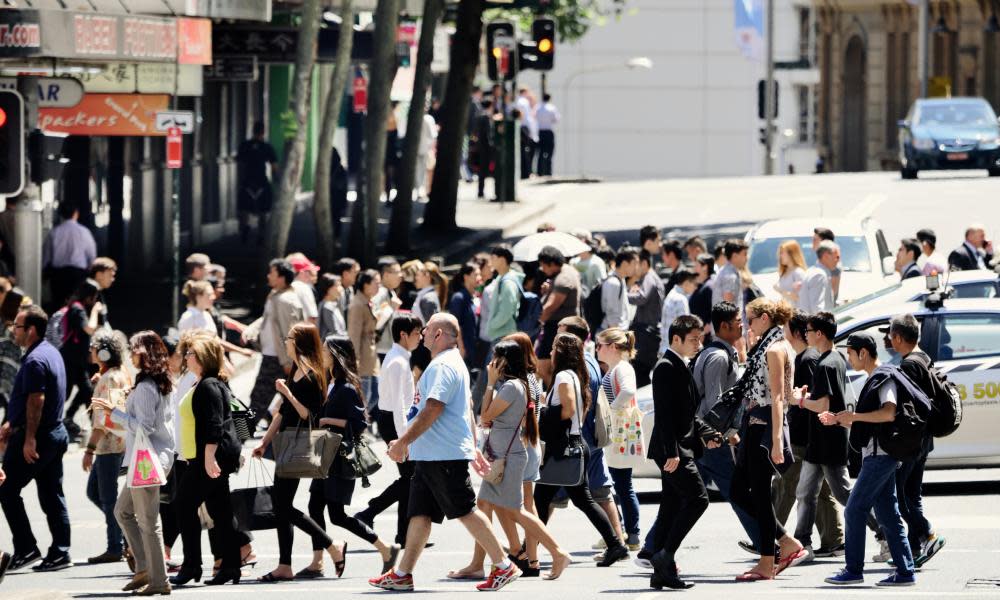Australians are getting poorer - but it has nothing to do with immigrants | Tom Westland

One of the reasons that economic growth is desirable is that it makes people more pleasant to be around. When we feel our wallets getting fatter, we tend to be more generous to those around us. This doesn’t mean that rich people are nicer than poorer people. But a given individual is usually better to be around when their financial situation is improving – they might buy a couple of rounds at the pub, say – than when it’s stagnating.
What is true of people is also true of societies, as Benjamin Friedman has argued. Citizens of a growing economy are less violent to each other and more hospitable to immigrants. Which brings me to the extraordinary outbreak of venom in Australia recently. As Antoun Issa argued in the Guardian, the sheer tonnage of undisguised hatred in the media of late is as extraordinary as it is worrying. And while it’s easy to dismiss the comments of those such as Rowan Dean or Prue MacSween as attention-seeking, it would be focusing too much on the supply of racist material and not enough on the demand for it.
One reason I suspect is that we do not feel like they’re getting any richer, and we’re looking around for people to blame. Australians are indeed, on some economic measures, getting noticeably poorer. One explanation is that we haven’t quite worked off the hangover from the mining boom: as the economist Ross Garnaut predicted, the end of the boom has led to stagnant incomes and a restless electorate. In addition, as Greg Jericho has argued, unions that used to fight for wage increases have become weak.
However, other people have taken to blaming Australia’s high immigration rates for the slide. Leith van Onselen, for example, on the Bolt Report, noted that Victoria, which has seen the highest immigration rates in Australia, has seen the lowest per capita income increase in the country since the global financial crisis. Isn’t that evidence that immigrants are lowering our living standards?
The problem forVan Onselen is that he’s got his economics wrong, and he’s measuring the wrong thing. Changes in gross state product per capita – the indicator they’re using – can’t tell you anything about the impact of immigration on living standards.
It’s like comparing oranges in 2009 with a mix of apples and oranges in 2016.
Let’s call one group of people the “original” group – people who were already here in 2009 – and the other the “immigrant” group, who’ve moved here since then. Van Onselen compares the living standards of the “originals” in 2009 with the living standards of both originals and immigrants in 2016. This tells us nothing. What we want to measure is the change in the living standards of “originals” from 2009 to 2016 (and, if you like, the change for immigrants, but this would mean finding out what those were in their country of origin).
This is much harder to measure, but there is some evidence to suggest that if you did the analysis properly, it would change Van Onselen’s conclusions.
Data from the 2016 census shows that income for recently arrived immigrants in Melbourne is on average substantially lower than it is for Australian-born residents. This means that the recent arrivals will “drag down” the average, even if they’re better off than they were before moving to Australia, and even if they’ve had no impact on the living standards of those who were already living in Melbourne.
The academic literature supports the idea that immigration is not likely to make non-immigrants any poorer. Studies suggest that, on average, immigration has little to no impact on wages. On employment it’s much the same: the consensus of research is that, statistically, immigrants either create more jobs than they “take”, or that they have no impact on jobs at all.
Of course, there is one other legitimate concern people have: that immigrants are straining Australia’s limited resources. Our cities feel crowded and our natural resources are under pressure. But this is almost entirely Australia’s own fault.
We keep on spending billions of public and private dollars on white elephants like the Adelaide-Darwin rail line because we’re too lazy to do the analysis required to allocate infrastructure money efficiently, or because politicians ignore analysis when it’s done. We are bungling the way we manage our water system, and an economically sensible scheme to reduce carbon emissions was abolished after one of the most deceitful political campaigns in Australian history.
In other words, we are as a nation wasting our own resources through sheer political laziness and incompetence.
Punishing aspiring immigrants for this would be like burning a bunch of $100 notes and then complaining that we didn’t have enough money to give to charity. Blaming them for our problems also feeds the kind of doltish hysteria that we’ve seen directed at high-profile immigrants recently. The economy may be turning sour, but that doesn’t mean we have to as well.

 Yahoo News
Yahoo News 
